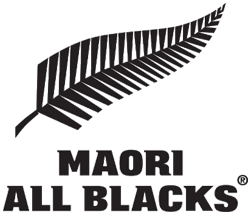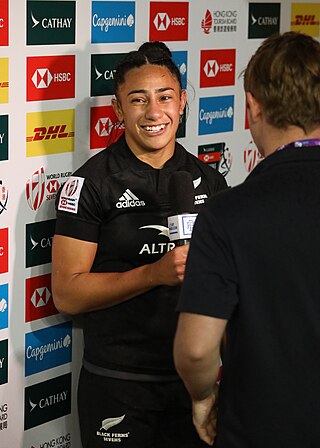
The New Zealand national rugby union team, commonly known as the All Blacks, represents New Zealand in men's international rugby union, which is considered the country's national sport. Famed for their international success, the All Blacks have often been regarded as one of the most successful sports teams in history.

New Zealand Rugby (NZR) is the governing body of rugby union in New Zealand. It was founded in 1892 as the New Zealand Rugby Football Union (NZRFU), 12 years after the first provincial unions in New Zealand. In 1949 it became an affiliate to the International Rugby Football Board, now known as World Rugby, the governing body of rugby union for the world. It dropped the word "Football" from its name in 2006. The brand name New Zealand Rugby was adopted in 2013. Officially, it is an incorporated society with the name New Zealand Rugby Union Incorporated.

"Ka Mate" is a Māori haka composed by Te Rauparaha, the historic leader of the iwi of Ngāti Toa of the North Island of New Zealand during the Musket Wars.
Michael James Bowie Hobbs, generally known as Jock Hobbs, was a New Zealand rugby union player and administrator. A flanker, he played for Canterbury and won 21 caps for the New Zealand national team, the All Blacks, between 1983 and 1986, with four tests as captain.

Sidney Milton Going was a New Zealand rugby union footballer. Dubbed Super Sid by his fans, he played 86 matches, including 29 tests, for the All Blacks between 1967 and 1977. He represented North Auckland domestically.

The New Zealand women's rugby union team, called the Black Ferns, represents New Zealand in women's international rugby union, which is regarded as the country's national sport. The team has won six out of nine Women's Rugby World Cup tournaments.

The Māori All Blacks, previously called the New Zealand Maori, New Zealand Maoris and New Zealand Natives, are a rugby union team from New Zealand. They are a representative team of the New Zealand Rugby Union, and a prerequisite for playing is that the player has Māori whakapapa (genealogy). In the past this rule was not strictly applied; non–Māori players who looked Māori were often selected in the team. These included a few Pacific island players and a couple of African descent. Today all players have their ancestry verified before selection in the team.
Haka, traditional dances of the Māori people, have been used in sports in New Zealand and overseas. Haka are performed to challenge opponents before matches. The dance form has been adopted by the New Zealand national rugby union team, the "All Blacks", the Māori All Blacks, New Zealand women's national rugby union team, the "Black Ferns" and a number of other New Zealand national teams perform before their international matches; some non-New Zealand sports teams have also adopted haka.

Liam Justin Messam is a retired New Zealand rugby union player who played in the TOP14 for RC Toulonnais. In Super Rugby, he previously played for the Chiefs, and for Waikato in the ITM Cup. Messam predominantly plays as a blindside flanker but can fill in at Number 8 as well as openside flanker. After the retirement of then Chiefs captain Mils Muliaina, Messam was named the team's new co-captain from 2012 onwards, alongside Aaron Cruden.

Thomas Rangiwahia Ellison, also known as Tamati Erihana, was a New Zealand rugby union player and lawyer. He led the first New Zealand representative rugby team organised by the New Zealand Rugby Football Union (NZRFU) on their 1893 tour of Australia. Ellison also played in the 1888–89 New Zealand Native football team on their epic 107-match tour, scoring 113 points, and 43 tries with the side.

Dame Farah Rangikoepa Palmer is a professor at Massey University and a former captain of New Zealand's women's rugby union team, the Black Ferns.

The New Zealand women's national rugby sevens team represents New Zealand in the World Rugby Sevens Series, Rugby World Cup Sevens, Summer Olympic Games and the Commonwealth Games.

Keith Davis was a New Zealand rugby union player who played for both New Zealand and New Zealand Māori. He played for Auckland, and won the Ranfurly Shield in his first ever provincial game. After gaining All Blacks selection in 1952, Davis toured with the team to Europe and North America in 1953–54. He played extensively for New Zealand Māori between 1952 and his retirement in 1959; his time with the team included matches against both South Africa and the British Lions. Davis was awarded the Tom French Cup for Māori player of the year in 1952, 1953 and 1954.
Exia Edwards is a former New Zealand rugby union player, representing New Zealand and Bay of Plenty. She made her international debut at the 1998 Rugby World Cup in the Netherlands. She was also part of two other successful Rugby World Cup's in 2002 and 2006.

Sarah Hirini is a New Zealand women's rugby union player. She has played fifteen-a-side and seven-a-side rugby union, as a member of the New Zealand women's national rugby sevens team and New Zealand women's national rugby union team. Hirini was captain of the New Zealand Women's Sevens team that won a silver medal at the 2016 Summer Olympics in Rio de Janeiro and back-to-back gold medals at the 2020 Summer Olympics in Tokyo and at the 2024 Summer Olympics in Paris. During her time with the team they won the World Rugby Women's Sevens Series in 2012–13, 2013–14, 2014–15, 2016–17, 2018–19, 2019–20 and 2022–23 as well as the Sevens league title for the 2023-24 season. She was a member of the fifteen-a-side 2017 and 2021 Black Ferns Rugby World Cup winning squads.

Portia Woodman-Wickliffe is a New Zealand rugby union player. She plays fifteen-a-side and seven-a-side rugby union, and was a member of the New Zealand women's national rugby sevens team and New Zealand women's national rugby union team. Woodman was a member of the New Zealand Women's Sevens team that won a silver medal at the 2016 Summer Olympics in Rio de Janeiro and gold medals at the 2020 Summer Olympics in Tokyo and at the 2024 Summer Olympics in Paris. She retired from international sevens rugby after the Paris Olympics.

Tyla King is a New Zealand international rugby union player, professional rugby league player and Olympian.

Risealeaana "Risi" Pouri-Lane is a New Zealand rugby sevens player. She captained the 2018 Youth Olympics squad that won gold in Buenos Aires. She also won gold medals with the Black Ferns sevens team at the 2018 Commonwealth Games, the 2020 Summer Olympics and 2024 Summer Olympics.
Jackie Patea-Fereti is a New Zealand rugby union player from the Petone Rugby Club. She played 18 tests for the Black Ferns between 2012 and 2019. She was a member of the 2014 Rugby World Cup squad in France. She also plays for Hurricanes Poua in the Super Rugby Aupiki competition and represents Wellington provincially.
Jazmin Felix-Hotham is a New Zealand rugby sevens player. She plays for the Black Ferns Sevens and represents Waikato provincially. Hotham was a member of the New Zealand Women's Sevens team when they won a gold medal at the 2024 Summer Olympics in Paris.















